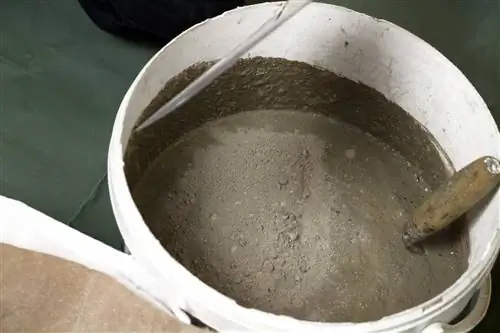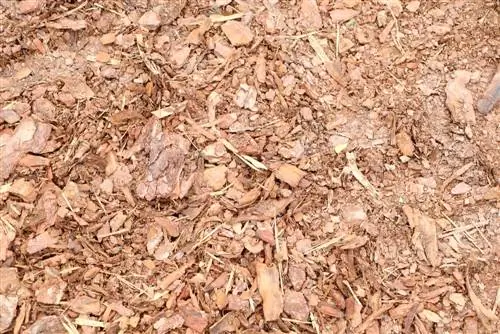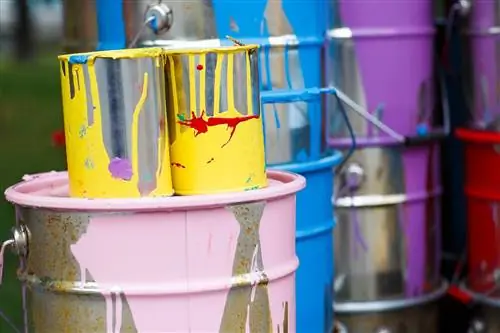- Author admin caroline@plants-knowledge.com.
- Public 2023-12-17 03:39.
- Last modified 2025-06-01 06:48.
Whether it's building roads, bridges or tunnels - concrete as a building material is versatile and can also be used in your own garden. Do-it-yourselfers often ask themselves the question of costs.
Different types of concrete
The production of the product can be done in different ways. Depending on the building materials used, there are different properties of the end product and thus advantages and disadvantages. It therefore makes sense to discuss which type is suitable for your own building project before breaking ground. Basically, a distinction is made between ready-mixed concrete, fresh concrete and ready-made concrete.
In addition to the classic types of concrete, depending on the building project, there are more exotic variants that have optimal properties for the corresponding building project. A distinction is made between the following types:
- Fiber concrete: Also contains plastic, textile, glass or steel fibers for defined properties
- Lightweight concrete: Particularly light weight due to air pockets
- Heavy concrete: High weight thanks to heavy aggregate
- Solid concrete: Product with high strength class C55/67 - C100/115
- Aerated concrete: Special manufacturing process ensures air voids in the end product
- Exposed concrete: Has a special appearance thanks to the creative formwork skin
- Prestressed concrete: Small crack widths thanks to prestressed prestressing steel
- Reinforced concrete: Steel inserts made of mats and wires ensure high tensile strength
Ready-mix concrete
This product reaches a construction site in fresh condition. The product is assembled in a concrete plant, from which a concrete loader or another suitable vehicle delivers the product. Much of the concrete used today is ready-mix concrete because its consistently good quality and sheer volume of ready-to-use product make it suitable for large projects, such as pouring a large slab foundation. The manufacturer himself is liable for the product.
Fresh concrete
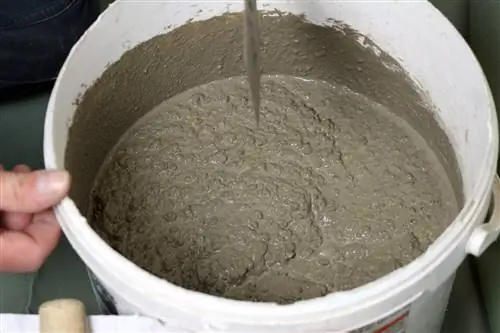
Fresh concrete is self-mixed concrete from the construction site. It contains all the usual ingredients, but often lacks additives such as those used in ready-mixed concrete or ready-mixes for improved properties. Imprecise working methods can be problematic during production, leading to uneven results and endangering the construction project due to the different properties of the respective concrete batches.
Precast concrete
Basically, all concrete consists of three basic ingredients: water, cement and gravel. The ready-made mixes in the hardware store are composed according to the exact manufacturer's recipe and promise consistent quality. Such a product is available in hardware stores as a dry product in a bag and consists of the following components:
- Cement
- Aggregate
- Concrete admixtures (sealants and stabilizers)
- Concrete additives (color pigments, steel fibers, synthetic resin, fly ash, silicate dust, tuff)
- Water
Tip:
Ready-made mixes are of absolutely perfect quality. The manufacturer's instructions regarding the addition of water must be strictly followed, as this is the only way to guarantee the stability and quality of the end product.
Prices per cubic meter
Of course, there are larger cost differences between the individual types of concrete. Which product is most worthwhile ultimately depends on the extent of the construction project. Ready-mixed concrete is the ideal solution for larger construction projects, not only in terms of costs but also from a technical point of view. Continuous concreting of large floor slabs or foundations is difficult to achieve by making your own concrete. Mixing ready-made mixtures is only worthwhile for small construction projects.
The higher quality the product, the more versatile the areas of application. The price results from the factors and individual wishes. On average, however, the mixtures are available quite cheaply in hardware stores. The bags usually go over the sales counter with a content of 25 kilograms. Smaller units are available at hardware stores for little money:
- Craft concrete: 13 euros for 3.5 kilograms
- Kneaded concrete: 10 euros for 2.5 kilograms
- Concrete screed: 7 euros for 25 kilograms
- Horticultural concrete: 6 euros for 25 kilograms
- Foundation concrete: 3 euros for 25 kilograms
Compressive strength
Indicating the price based on a cubic meter is common practice in many places. Such a price is usually given at the same time as the compressive strength. On average, the following prices result for ready-made mixtures with the respective pressure strengths:
- C40/50: 105 € / m³
- C35/45: 95 € / m³
- C30/37: 87 € / m³
- C16/20/25: 77 € / m³
- C12/15: 71 € / m³
- C8/10: 66 € / m³
Quantity calculator for ready-mixed concrete
Some manufacturers indicate on the bags exactly how much of the product is needed to fill one cubic meter. But even without manufacturer information, calculating the requirements is not difficult. On average, concrete has a density of around 2.5 kilograms per cubic decimeter. For one cubic meter, around 2,500 kilograms of concrete are required.
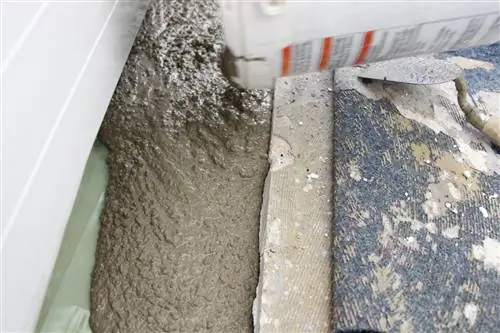
Rule of thumb:
A bag with a typical weight of 25 kilograms produces around 10 liters of a usable ready-made mixture.
It takes 1,000 liters to fill a hole the size of one cubic meter. This results in a consumption of 100 bags of ready mix, each of which produces 10 liters of ready-to-fill material. Since the various products from each manufacturer differ in their composition, this is only a rough calculation example. The exact amount of product required can only be calculated based on the exact properties of the respective products.
Price-determining factors
Ready-made mixes are available in numerous versions from hardware stores and thus cover a wide range of uses. The additives contained are noticeable in the price and cause different surcharges:
- Degree ofPumpability: + approx. 10 € / m³
- Surcharge forFrost protection: + approx. 5 € / m³
- Addition ofFluent: + approx. 5 € / m³
- Addition ofAir entraining agent: + approx. 5 € / m³
- Variety ofConsistency: + approx. 10 € / m³
- Compressive strength of the building material: see above
- Setting-Retarder: + approx. 5 € / m³
- Accelerator for binding: + approx. 30 € / m³

